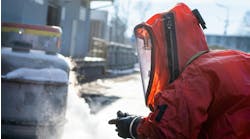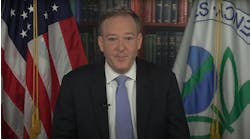The U.S. Environmental Protection Agency on Dec. 9 banned trichloroethylene and perchloroethylene, two solvents commonly found in consumer products, due to their cancer-causing potential.
What is trichloroethylene?
Trichloroethylene, or TCE, is a solvent widely used in dry cleaning, fabric finishing metal degreasing, spray coatings and automotive care products like brake cleaners. It’s known to cause serious health risks including cancer, neurotoxicity and reproductive toxicity, according to the EPA.
What is perchloroethylene?
Perchloroethylene or PCE, is the primary solvent used in dry cleaning. The substance can enter the body through respiratory and dermal contact. Exposure symptoms include depression of the central nervous system; damage to the liver and kidneys; impaired memory; confusion; dizziness; headache; drowsiness; and eye, nose and throat irritation, according to the National Institute for Occupational Safety and Health. The solvent is considered a potential human carcinogen.
Ban Details and Impact
Under the new rule, the EPA will phase out TCE over time, with the majority of identified risks eliminated within one year, and safer alternatives are readily available for the majority of uses. The agency will phase out PCE in dry cleaning over 10 years to eliminate risks for people who work in dry cleaning facilities.
The EPA ban still allows PCE to be used in various industrial applications, including in aviation and defense, providing strict rules are in place to protect workers. For several uses of TCE that will be totally prohibited, there is an analogous use of PCE that can continue safely under workplace controls. Allowable uses include industrial and commercial use as an energized electrical cleaner, in laboratory use for asphalt testing and recovery, use to make refrigerants and other chemicals and for vapor degreasing.
TCE and PCE were primary chemicals that investigators cited in a report detailing exposure of U.S. Marines stationed at Camp Lejeune in North Carolina, over several decades. Two people impacted by the contaminated drinking water issued statements in support of the EPA ban.
Jerry M. Ensminger, a retired U.S. Marine Corps master sergeant, said his 9-year-old daughter died from leukemia in 1985 after being exposed to the tainted water. He and Mike Partain, who was conceived on the base and later diagnosed with male breast cancer, lead an advocacy group called Camp Lejeune Legal.
“Mike and I welcome this ban on TCE by the EPA and this is proof that our fight for justice at Camp Lejeune was not in vain,” Ensminger said.
Michal Freedhoff, assistant administrator for the Office of Chemical Safety and Pollution Prevention, said the rules are grounded in the best-available science.
“It’s simply unacceptable to continue to allow cancer-causing chemicals to be used for things like glue, dry cleaning or stain removers when safer alternatives exist,” he said.



